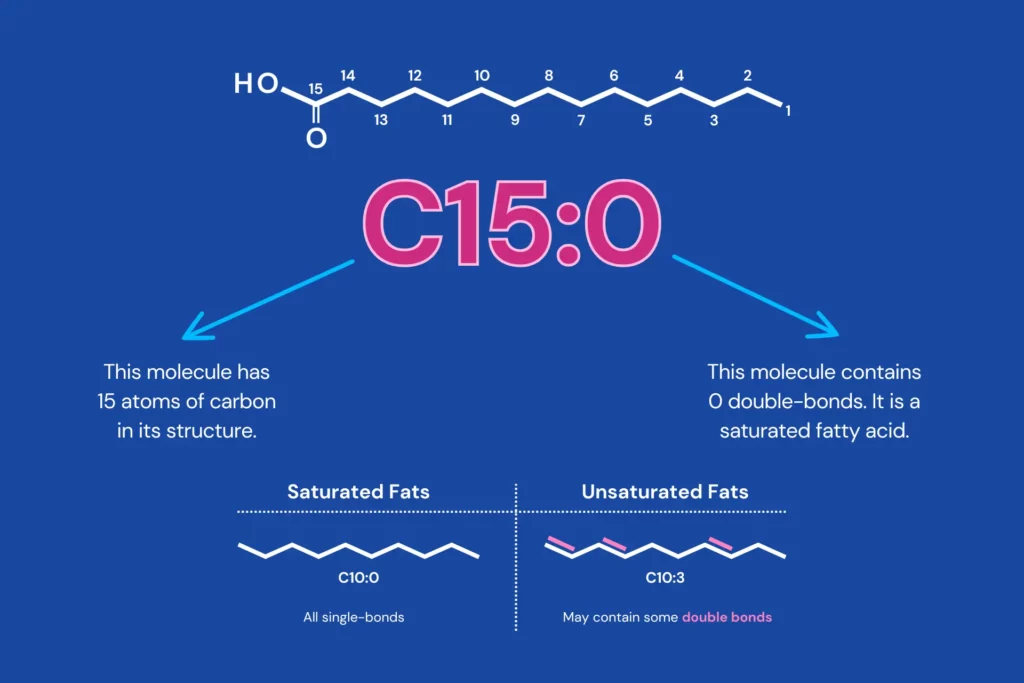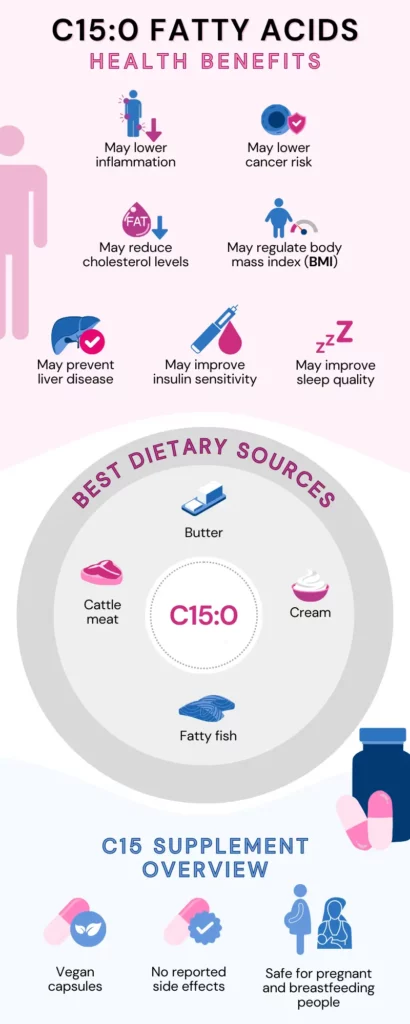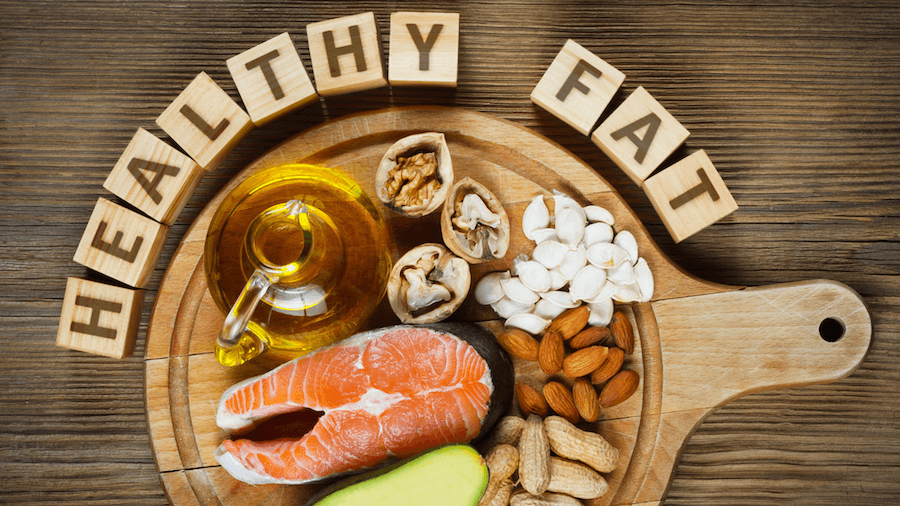The term ‘saturated fat’ has been associated with dietary red flags for years. Several studies have shown that saturated fats can cause cholesterol buildup, arterial blockage, and poor overall health. However, new research says these may be due to even-chain saturated fats - molecules with an even number of carbon atoms. On the other hand, odd-chain saturated fats like C15 fatty acids could be the key to promoting several facets of overall health. Are they really as healthy as they seem?
What Does Saturated Fat C15 Mean?
C15:0, or pentadecanoic acid, is an odd-chain saturated fatty acid.
It has an odd number of carbon molecules (15 to be exact) in its rigid, chain-like structure.
C15:0 exists in trace levels as dairy fat in butter and other milk-based products.

What Does C15 Do?
There’s a taboo surrounding all saturated fats, so how come odd-chain saturated fats promote health?
The answer lies in their metabolism.
Even-chain saturated fatty acids break down to produce acetyl CoA. This molecule helps generate energy through the Krebs cycle and promotes fat storage.
Odd-chain saturated fats break down to produce propionyl CoA, a molecule whose primary function is to replenish energy through the Krebs cycle. It doesn’t promote fat synthesis and storage.
Thus, odd-chain saturated fats are healthier than even-chain saturated fatty acids.
In fact, pure C15:0 in the body performs several functions.
It can:
- Lower inflammation
- Prevent cancer
- Reduce cholesterol levels, protecting against heart disease
- Regulate body mass index (BMI)
- Improve insulin sensitivity
- Prevent liver disease
- Induce deeper sleep
- Boost mitochondrial function
How Does Your Body Produce C15?
To produce a 15-carbon-long fatty acid, your body can either concatenate smaller fatty acids or break down larger ones. Here’s how these processes work:
- From small-chain fatty acids: When you consume dietary fiber, your gut bacteria synthesize propionic acid, a short-chain fatty acid (C3:0). Later, your liver can use these molecules of propionic acid to construct C15:0.
- From very long-chain fatty acids: Though a rarer process, larger molecules like C23:0 or C25:0 (found in the brain) could be broken down to C15:0.
How Much C15 Do You Need Daily?
Experts agree that the ideal concentration of C15 in the bloodstream is 10-30 micromoles (µM). Consuming 100 to 300mg of C15 daily can maintain healthy levels of this fatty acid.
Since research is ongoing, experts haven't finalized the exact limits and range yet.
A C15 deficiency could set in if you don’t consume at least 100mg of C15:0 daily.

Health Benefits Of C15 Fatty Acid
C15 Fatty Acid For Age
The mitochondria regulate metabolism at a cellular level.
As you age, the processes in your mitochondria slow down, leading to a poorer metabolic rate and easier onset of more diseases.
C15 molecules can be elongated to C23:0 fatty acids, which can then be broken down into valuable compounds like propionyl coenzyme A (CoA).
Propionyl CoA helps replenish and prolong the Krebs cycle, an essential part of metabolism.
Thus, C15 can help restore metabolic function in aging people.
C15 Fatty Acid For Brain Health
C15 can be converted to penta-decyl-carnitine (PDC).
PDC can cross the (very selective) blood-brain barrier and influence the chemical environment there.
PPARα is a receptor that controls inflammation and metabolism in several body parts.
Beyond the blood-brain barrier, it promotes better cognition, sleep, and overall mood.
Research has shown that C15:0 can activate the PPAR pathway to a moderate extent.
This finding was confirmed across different genes and receptors, proving that C15 can improve overall brain health.
C15 Fatty Acid For Diabetes
Several studies have investigated the effect of odd-chain saturated fats (15:0 and 17:0) on plasma glucose levels.
They found an inverse relationship between these factors, meaning that higher levels of C15 were associated with lower fasting plasma glucose levels.
This relationship is clinically relevant across different liver fat levels, BMIs, ages, and sexes.
C15 Fatty Acid For Cardiovascular Diseases
Whole milk contains several even-chain saturated fats, such as stearic and palmitic acid, which have been associated with several health complications in the long term.
Consequently, the consumption of whole-fat milk has decreased, but the prevalence of heart disease has persisted.
An 18-year-long study of over 25,000 people noted that children who regularly consumed whole-fat milk while growing up were less likely to be obese or have dangerous heart conditions.
This is likely due to the effect of the trace content of odd-chain saturated fatty acids (like C15) in whole milk.
How To Increase C15 Fatty Acid Levels
The harmful effects of overconsuming saturated fats were established decades ago.
As health awareness grew, people avoided them, but the prevalence of life-threatening metabolic diseases didn’t waver.
With the recent light shed on the benefits of odd-chain saturated fats like C15, scientists have noted that its population-wide concentration is lower than it should be due to the taboo around all saturated fats.
Despite being an essential fatty acid, its endogenous production (within the body) is extremely slow.
Thus, some experts recommend consuming more C15 through diet or supplementation.
Dietary Sources Of C15
Dairy fats like butter are the best dietary sources of C15, with up to 880mg of C15 per 100g of butter.
However, they are also laden with unhealthy, even-chain saturated fats.
Cattle meats like beef have around 350mg C15 per 100g of butter.
Like omega-3 fatty acids, C15:0 is also naturally present in fatty fish, with 160mg of C15:0 per 100g.
What Vitamins Improve C15 Levels?
The vitamins with the most significant impact on C15 levels are:
- Vitamin B12: Supports red blood cell development and energy production, which boost C15:0.
- Vitamin D: Regulates fat absorption and mobilization around the body
- Vitamin E: Acts as an antioxidant to protect C15 from oxidative damage by free radicals
C15 Supplements: What The Experts Say
Seraphina Pharmaceuticals has obtained an exclusive license to produce and distribute C15 supplements.
Their fatty15 capsules contain 100mg of C15, and they recommend consuming one a day.
The recommended duration for C15:0 supplementation is 12 weeks.
This regimen has helped lower glucose, cholesterol, inflammation, and rate of weight gain in models of obesity, diabetes, and fatty liver disease.
Several studies have validated C15:0’s ability to activate beneficial receptor pathways across the body, enhancing overall health.
Stephanie Lappe, a registered dietitian, reviewed fatty15 and rated it 4.2 out of 5 stars.
“The unfolding research on C15:0’s benefits is fascinating. As a dietitian and health enthusiast, I’m eager to see if and how future research on Fatty15 and the role of C15:0 shapes dietary recommendations”, she said.
However, there haven’t been enough validated studies in human populations to confirm the positive effects of C:15 supplementation.
C15 Supplement Reviews
Seraphina Pharmaceuticals has an A+ rating on the Better Business Bureau and a perfect 100% on ScamAdvisor.
On Reddit, it has a positive word of mouth, with several customers praising its effect on overall health.
Since it’s relatively new, most consumers have an overall positive opinion of Fatty15’s supplements.
Side Effects of C15 Supplements
The FDA has certified Fatty15 as ‘generally recognized as safe (GRAS)’.
There are no warnings against taking the supplements while pregnant or breastfeeding. So far, no reported side effects or contraindications of C15 have been reported.
Who Should Take C15 Fatty Acids?
C15 supplements can significantly benefit people who generally avoid dairy.
This can include people on a strict vegan diet or those with lactose intolerance.
Since it can boost metabolism, it can also benefit people who are starting to see the downsides of aging.
Who Should Not Take C15 Fatty Acids?
People who regularly consume C15 through dairy fats like butter may not need C15 supplementation.
They can meet their C15 requirements quickly.
It’s always best to consult a registered dietitian, nutritionist, or physician before starting or stopping a supplement regimen,
FAQs About C15
What Is The Best Source Of C15?
The best natural source of C15 is unsalted butter, with around 880mg of C15 per 100g.
The best non-dairy source of C15 is cattle beef, with 350mg of C15 per 100g.
What Are The Symptoms Of C15 Deficiency?
Since C15 plays a significant role in metabolism and energy production, people with C15 deficiency exhibit general symptoms like fatigue and poor sleep, but they are also at a higher risk of developing conditions like anemia, heart disease, and diabetes.
Is C15 Better Than Omega-3?
According to Fatty15, a company that sells C15:0 supplements, C15 is healthier than omega-3 fatty acids because it provides more health benefits, nourishes and supports more kinds of cells, and is non-toxic to virtually all cells.
Summary: C15 Fatty Acids
- C15 is an essential odd-chain saturated fatty acid, which is beneficial to the body but not naturally produced in large enough amounts.
- It has several health benefits, such as improving mitochondrial, heart, and brain function. It also helps control inflammation, cholesterol buildup, and insulin levels.
- Dairy fats like butter and cream are the best sources of C15, followed by beef and fatty fish meat.
- Fatty15 is an FDA-approved brand of C15 supplements that help restore overall health and streamline body functions.
- It is FDA-approved and has no side effects at the moment.
Others Are Also Reading

Rapamycin Supplement: The New Longevity Drug?

Supplements To Increase Brown Fat

Reviewing The Most Popular Diets Of 2024
References
https://www.ncbi.nlm.nih.gov/pmc/articles/PMC10649853
https://clinicaltrials.gov/study/NCT04947176
https://www.sciencedirect.com/science/article/pii/S0022316622164370




